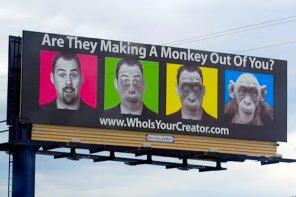“Through the study and analysis of a system’s components, a design theorist is able to determine whether various natural structures are the product of chance, natural law, intelligent design, or some combination thereof…”
–(from the Web site of the Center for Science and Culture)
“People of faith are in their different ways planning your and my destruction, and the destruction of all the hard-won human attainments that I have touched upon. Religion poisons everything.”
–Christopher Hitchens
A friend quipped recently that the two topics a liberal and a conservative should never discuss together are abortion and health care reform. She should have added the topics of science and religion to her list.
Why do attempts at reasonable discussion between science and religion in our society today range from disastrous to nonexistent? We need to step back and understand the broader context. Why do these discussions fail? How did the contemporary impasse arise? How might we as a society move beyond it?
A little background:
A Bloody Family Feud
Think of it as a family feud running across three generations. The first generation spans from the Greeks through the early medieval period. During this period, philosophy and theology set the terms of engagement. Knowledge for Aristotle and his medieval followers (epistēmē) was created in the image of philosophy. The Latin term for science, scientia, meant any form of organized inquiry. Unfortunately for the birth of modern science, in such a context one couldn’t even begin to make a case for the primacy of empirical observation, much less for quantum mechanics or evolutionary theory as we know them today.
Call the scientists and philosophers of modernity the next generation. The sons and daughters of the late medieval period simply had no choice. The only way they could carve out a space for their new empirical modes of inquiry was to flatly reject the medieval authorities and their assumptions. Thus Descartes proclaimed that everything is open to doubt; Francis Bacon berated the four “idols” of traditional philosophy and theology; and Galileo, somewhat more gently, wrote of The Book of Nature, written “in the language of mathematics,” as separate from the Book of Scripture.
This declaration of independence may have been peaceful at first. But it quickly deteriorated into a war fully as bloody as the French Revolution. Thus Andrew Dickson White rightly characterized the modern period as A History of the Warfare of Science with Theology in Christendom. Christopher Hitchens is only reflecting the prejudices of his generation when he expresses his hatred of religion in God is Not Great:
“Religion has caused innumerable people not just to conduct themselves no better than others, but to award themselves permission to behave in ways that would make a brothel-keeper or an ethnic cleanser raise an eyebrow.”
For the children of the third generation, however—call them postmodern, for want of a better word—the battle to the death between science and religion no longer seems either necessary or productive. Like children who can’t comprehend why their parents and grandparents must fight so much, this new generation has simply discarded the assumptions on which the centuries-long war was based. Thus the last few decades have seen multiple proposals for harmonizing, if not unifying, science and religion. (More on these in future weeks.)
This saga of three generations is crucial for understanding the current cultural situation. Some of the implications are deadly serious. Others come with a touch of irony. It amuses me, for example, to recognize that the much-touted “New Atheists” (Dawkins, Dennett, Harris, etc) are not the wave of the future. Instead, this analysis leaves them looking like dinosaurs; throwbacks to an earlier (second) generation attitude toward science and religion.
The Battle Lines Today
So much for intergenerational histories in the abstract; the juicy stuff always lies in the details. When we survey the opposing armies, what do we see?
The forces of science:
Those who start from the standpoint of science fall into three main groups: the New Atheists, who argue that the mere existence of religion is a threat to science and weakens it; the “privately religious” scientists, who argue that their private faith supplements their science, but who spend rather less time talking about how this actually works; and the True Separationists, who argue that the two spheres are, and ought to be, completely independent and have nothing to do with each other.
Relatively few scientists are working constructively to build conceptual bridges between science and religion. (Of course, this makes the few who are all the more important.) Most bench scientists are suspicious of those who call for an integration of science and religion; a new unitary perspective that draws from and learns from both. New Age, Eastern, and some liberal theologians, for example, make such calls, and upon them are heaped the greatest amounts of scorn.
The forces of religion:
Publicly, most American Jews and Christians express interest in the religion-science discussion. In most cases, though, the motivation is defensive; people don’t want anyone to think that their faith undercuts or opposes science in any way. It’s quite another matter to view the discussion as a two-way street—one that might require believers to rethink and reformulate some of the important tenets of their religious tradition.
Learning to Work Together
In the American public square today, it’s hard to find discussions of the interplay between science and religion that achieve what our society most needs: genuine self-criticism on both sides, born of the recognition that both sides will have to do some bending if any sort of truce is to be achieved.
Yet if we do not begin to engage in productive partnerships, how will we address those urgent global issues (such as global climate change) that can be solved only if the sciences and the religious traditions learn to work in tandem?
In future columns, I’ll present specific cases of science-religion confrontation in our culture, analyzing the disasters and searching for cases of constructive engagement.
Next time: Evolution and Creation Fight to the Death… and What Emerges from the Ashes.




